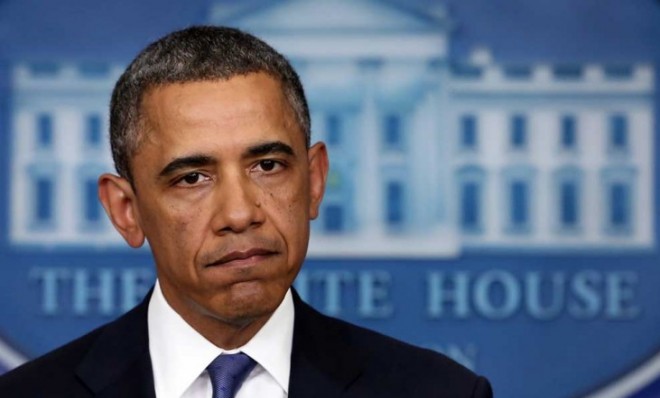4 weird effects of going over the fiscal cliff
We all know about the steep tax hikes and spending cuts scheduled to slam the country come Jan. 1. But what about a massive spike in the price of milk?

A free daily email with the biggest news stories of the day – and the best features from TheWeek.com
You are now subscribed
Your newsletter sign-up was successful
On Friday, President Obama said he was "modestly optimistic" that the House and Senate will stop the U.S. economy from plummeting off the fiscal cliff. Failing that, Obama is asking Senate Majority Leader Harry Reid (D-Nev.) to put forward a bill that will stop tax hikes on the middle class and protect extended unemployment benefits — "the bare minimum," as Obama puts it. But now negotiations are stalled, and it seems more and more likely that we'll plunge over the cliff.
Getting hit with billions in tax increases and spending cuts isn't the only bad news if Congress fails to broker some kind of fiscal cliff deal. Here are four of the weirdest economic aftershocks to look out for in the New Year.
1. Super-expensive lattes
The Week
Escape your echo chamber. Get the facts behind the news, plus analysis from multiple perspectives.

Sign up for The Week's Free Newsletters
From our morning news briefing to a weekly Good News Newsletter, get the best of The Week delivered directly to your inbox.
From our morning news briefing to a weekly Good News Newsletter, get the best of The Week delivered directly to your inbox.
Even baristas in small-town Montana are paying attention to the fiscal cliff — thanks to a report by The Washington Post revealing that milk prices could double without a deal. After December 31, the Department of Agriculture will automatically revert to a 1949 law that relies on an outdated formula for how much the government has to pay dairy farmers. The result? Say hello to $8 gallons of milk and… straight espresso.
One reason a farm bill hasn't passed is House Speaker John Boehner (R-Ohio) refused to include it in fiscal cliff negotiations, fearing it would slow down Congress even more. (A bill passed through the Senate, but has stalled in the House.) While the Department of Agriculture is working hard to stop the "milk cliff," The Washington Post editorial board says that Congress is going to get what it deserves: "The pain might be worth it if it finally shocks the country into demanding an end to Congress's fiddling with the milk market."
2. Airport chaos
Fiscal cliff-induced budget cuts could mean the Transportation Security Administration (TSA) will have to lay off thousands of baggage screeners, preventing full screening for many passengers, according to USA Today. But even if you think airport screening is a pointless security charade, there's still bad news: The cuts could mean that the Federal Aviation Administration will have to fire air-traffic controllers, which could lead to airport closures.
A free daily email with the biggest news stories of the day – and the best features from TheWeek.com
Still, if you're flying home after January 2, you don't have to change your ticket just yet. John Porcari, deputy secretary of transportation, wrote in a memo that the cuts will be spread out over 2013 and "I do not expect our day-to-day operations to change dramatically on, or immediately after, Jan. 2."
3. Cheaper gas
If Congress manages to reach a deal — or even if Sen. Reid gets a bill through that would protect middle-class tax cuts, as President Obama has requested — there would likely be a spike in consumer confidence, raising demand for oil. But if a deal isn't reached, and the economy creeps back toward recession, demand for fuel will fall (because presumably, Americans won't have money to go anywhere), slashing gas prices. Gas prices might also be a good index for how optimistic Americans are that a deal can actually be reached — in New York, the price of oil plummeted $1.47 last Friday (to $88.66 a barrel), the lowest number in three weeks. But as news spread that Obama was meeting with House and Senate leaders, gas prices timidly recovered.
4. Gold jewelry will get more expensive
When the president warns that the world economy could be adversely impacted because Congress can't do its job, it's hard for consumers to have faith in the U.S. dollar. As a result, people are already stocking up on the next best thing: Gold. The price of the commodity rose on Thursday in proportion to the escalating fear that a fiscal cliff deal won't be reached by 2013. And according to Money Morning, during the debt-ceiling crisis last year, there was a 30 percent increase in the price of gold — a cost-climb we are likely to see again should the latest negotiations fail.
So forget the Mayan Apocalypse. If you really want to be ready for 2013, stop flying and stock up on rice milk. Or just hope Congress gets its job done.
Dana Liebelson is a reporter for Mother Jones. A graduate of George Washington University, she has worked for a variety of advocacy organizations in the District, including the Project on Government Oversight, International Center for Journalists, Rethink Media, the Reporters Committee for Freedom of the Press, and Change.org. She speaks Mandarin and German and plays violin in the D.C.-based Indie rock band Bellflur.